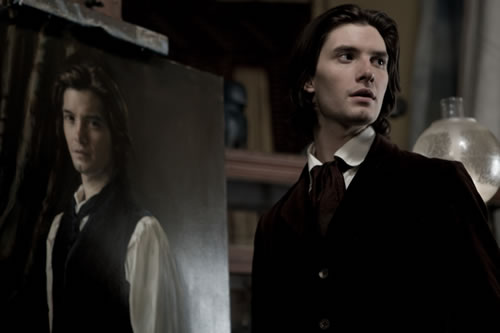Back to normal, I think: it is time to take a different "perspective" on what has been nothing more than an "experience". And if you've already seen the movie, you know exactly what I'm hinting at. Yes, that's right; it's time for the review of...
SPOILERS BELOW!!!
Title: Dorian Gray
Director: Oliver Parker
Stars: Ben Barnes, Colin Firth, Ben Chaplin, Rachel Hurd-Wood, Rebecca Hall
 Review
Review: First point - I am a major fan of Oscar Wilde, and The Picture of Dorian Gray is my favourite novel. With this in mind, I decided that I would never be happy with the film if I expected it to follow the novel exactly, and so watched it with an open mind as to the storyline. It's a good job, too, because they changed just about everything they could get away with changing. However, I am going to review it first as a film, and then as a film adaptation.
It was shot in a way that was what we expect from this time of movie: I felt there was nothing revolutionary in the style, the tone, or even in the special effects involved with the painting. Colours were a little muted, as you'd expect, but still rich to reflect the theme of hedonism. The sound was really very quiet for a modern film, with more than one moment of utter silence as Dorian contemplated his fate or tried to get out of a difficult conversation. The ghostly whisperings and groanings of the painting were, while a bit far-fetched when taken seriously, a good metaphor for his internal torment and paranoia. The use of the flashbacks related to the attic and his grandfather's treatment of him were also skillfully intermixed with these noises, until Dorian's lie at the end - "it's just an old portrait of my grandfather" - could almost be believed.
If you were unaware completely of the original storyline, Dorian's fall from grace is well presented and understandable. His naivety is shown as he is pick-pocketed more than once in his first scene in London, and his impressionable nature is shown here too, setting the scene for how easily Lord Henry can manipulate him into practicing what he preaches. The wild nature of the parties, while in some scenes a little explicit, is a lot more tame than something you might find in, say, The Tudors, but does the job of portraying Dorian's lust and corruption. The homoerotic nature of some of the scenes is slipped in neatly, with no fuss or preamble, simply presented as a fact - which is as it should be. If Dorian can take drugs and drink and whore, it should not be any more shocking to the viewer that he can also do all those things with other men.
However, these things were not and could not have existed in the original text, for the very good reason that even the hint of them landed poor Oscar in jail. Which brings us to the important point: the film as an adaptation really rather invents itself.
Dorian was abused as a child? Ungrounded. Dorian meets Lord Henry in his first two weeks in London, at a party? False - he lived in London for an indefinite period of time and met Henry while his portrait was being painted. The time scale is much too late (and why, in wartime England, are the characters still costumed like 19th century dandies?). The scenes between Basil and Dorian are also largely unfounded - what hints are in the novel point more to a relationship between Henry and Dorian, whereas in the film Henry goes so far as to refuse Dorian's embrace. The corruption in the novel, when one really analyses it, is based on Dorian's infatuation with Henry, whereas in the movie he simply admires his philosophy. For the first half of the film I didn't understand why they should swap Henry and Basil's roles like this - but then it all became too clear. Henry's daughter is a complete fabrication. Why should Dorian fall in love again, after Sybil? This is especially confusing when Dorian stands before Sybil's grave and cries for her love, but then runs to Emily's arms - why? The finale is also difficult to swallow, with Henry in fact being the one to destroy the painting. Yes, Dorian stabs it - but this could be seen as cowardice, since the painting is already being destroyed by the flames and he has no choice. In the novel he makes his own choice to destroy the painting, and thereby take his own life - but in the film the loss of his life is simply a side-effect of the fire rather than something caused by the painting itself. It also seems that Dorian is reviled for his young looks rather than the things he has done, which in the novel is again not the case; he gains notoriety as the sort of person that will ruin your reputation and then leave you in the gutter with an addiction, much like Sybil feared he would.
I could go on and on for pages about the differences and incongruences, but if you really wish to understand them you could just, well, read the book. When reading a version with notes, one discovers that the overriding charm of the novel is it's subtlety. What ghastly sins does Dorian commit? Wilde never tells you explicitly - just gives you little hints, and examines Dorian's conscience and the effect it has on him in a deeper way. This trauma is not present for much of the movie. We see Dorian slide into madness, not grief - and when we see everything he does, it seems his only crime is murder. Surely the Radleys are to blame, for their own lust and deceit? Surely those present at the parties chose to be there, fully expecting what they got? Surely the blame isn't on Dorian? But this is the point - in the novel, Dorian deliberately corrupts others rather than just enjoying himself. The film fails to show this.
As an adaptation, I would give this around 5/10. But as a movie, ignoring the original context, perhaps viewing it as the novel Oscar Wilde might have written had he written it this year (for example, the inclusion of the First World War, which happened after Oscar's death), I would give it a higher rating of 9/10. It is well scripted, well acted, well shot - but only when taken out of the original novel's context.


